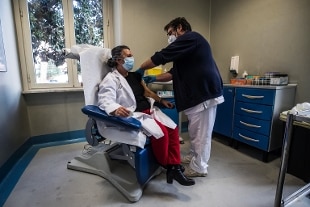Vaccini, WHO gives the green light to Pfizer-BioNTech
Vaccines, India authorizes emergency use of AstraZeneca
Vaccini, says the head of BioNTech: "Alone we can't cover the needs"
Vaccini will start on the 27th throughout Europe.
Locatelli: 42 million vaccinated in autumn
Share
January 02 2021 There are 45,667 people vaccinated in Italy against the coronavirus according to the latest updated data published on the portal of the extraordinary Commissioner for the Covid emergency.
Of these, 26,068 are women while men vaccinated since December 31 are 19,599.
In the first place among the regions for number of administrations is Lazio (9,301), followed by Veneto (6,041) and Piedmont (6,024).
Vaccinations have so far almost entirely affected the category of health and social health workers (40,148), to a lesser extent residents of residential structures (3,338) and non-health personnel (2,181).
Finally, as regards the age groups, in first place people between 50-59 years, with 13,086 vaccine administrations, followed by the age group 44-49 (10,475), that between 30-39 years (7,972) and that between 60-69 years (6,599).
Phase 1 of the vaccination, which officially started between 30 and 31 December depending on the region, involves health and social health workers (currently 40,148 vaccinated), non-health personnel (2,181) and RSA guests (3,338 ).
The updated report on the number of Italians vaccinated against Covid-19 is available from 31 December.
This was announced by the extraordinary commissioner for the emergency Domenico Arcuri.
Vaccinations around the world
In the meantime, 10 million people have been vaccinated around the world, according to data reported by the scientific publication site Our World In Data, developed by the University of Oxford.
China immunized around 4.5 million people, followed by the United States (2.79 million), United Kingdom (1 million).
One million people have also been vaccinated in Israel (which has about 9 million inhabitants).
Then Germany with over 165,000.
The site clarifies that the numbers refer to single injected doses, therefore not to full vaccination, which requires a second booster.
Numbers that have raised controversy and questions about why Italy is proceeding more slowly.
But Franco Locatelli, president of the Higher Health Council (Css) and member of the Scientific Technical Committee, replies to the criticism: "Reading from time to time that Italy is lagging behind other countries on the continent seems frankly ungenerous".
But the comparison with other European countries returns to occupy the debate, even on social networks.
"Small and simple reminder: to vaccinate only 50% of Italians in 10 months, about 60 million inoculations (30 X 2) are needed. An average of 200,000 vaccinations per day must be made" writes the Luigi Einaudi Foundation on Twitter based on the data collected by the information campaign #quantivaccini and on the Foundation's website.
The Israel case, a million people already vaccinated
In the battle at Covid, Israel runs more than the rest of the world: it has already exceeded 10% of the population immunized with the first dose of the vaccine, that is to say one million people out of just over 9 millions of inhabitants. Suffice it to say that Bahrain, in second position, is at 3.45% and the US at 0.84%.
It is not for nothing that Israel is called 'a success story'.
The goal - according to the intentions of the Minister of Health Yuli Edelstein - is to reach an almost completely immunized country by the end of March.
"I feel a great emotion," said Prime Minister Benyamin Netanyahu as he met the millionth immunized in the Arab town of Umm El Fahem in the north of the country.
"We have obtained millions of doses, we have preceded the whole world and we are proceeding at high speed to immunize the entire population, to save lives."
A record that the Israelis, but also the premier, can only appreciate in view of the elections in March.
The country has closed a contract with Pfizer for a massive initial supply - between 4 and 6 million doses, according to media reports.
Moreover - the analysts underline - with a limited population, a homogeneous geographical area, a modern public health system, largely digitized, the country has the characteristics of a perfect laboratory where to experiment with mass vaccination.
We should not forget an economic fact that the government has certainly not ignored: the sooner the country will emerge from the pandemic and the sooner the productive and social system will get back into motion.
The process of the first phase was so fast that in mid-January the ministry of health as a precaution will suspend new vaccinations for 2 weeks in order to ensure the second dose for those already immunized.
Then, according to forecasts, the race will resume: 3-4 million doses will arrive in February and more afterwards.The goal is precisely another record: to make Israel by the end of March the first country in the world to be fully immunized .
"That day - said Edelstein - we will say 'Hasta la vista, coronavirus'".
Vatican, vaccinations start from mid-January
The anti-Covid-19 vaccination campaign within the Vatican City State will start in the coming days. This was announced by the Health and Hygiene Department of the Governorate. It is foreseeable that the vaccines will arrive in the State in the second week of January, in a quantity sufficient to cover the needs of the Holy See and the Vatican City State. An "ultra low temperature refrigerator" was purchased to store the vaccine doses. The administration of the vaccine should begin in the second half of January, planned according to the selection criteria of the categories most exposed to the infection and according to voluntary accessions. Priority will be given to health and public security personnel, the elderly and to personnel most frequently in contact with the public. The doses will be administered in the atrium of the Paul VI Hall, by qualified medical and nursing staff of the Directorate of Health and Hygiene of the Governorate of the Vatican City State, always in line with the health recommendations for the pandemic.

